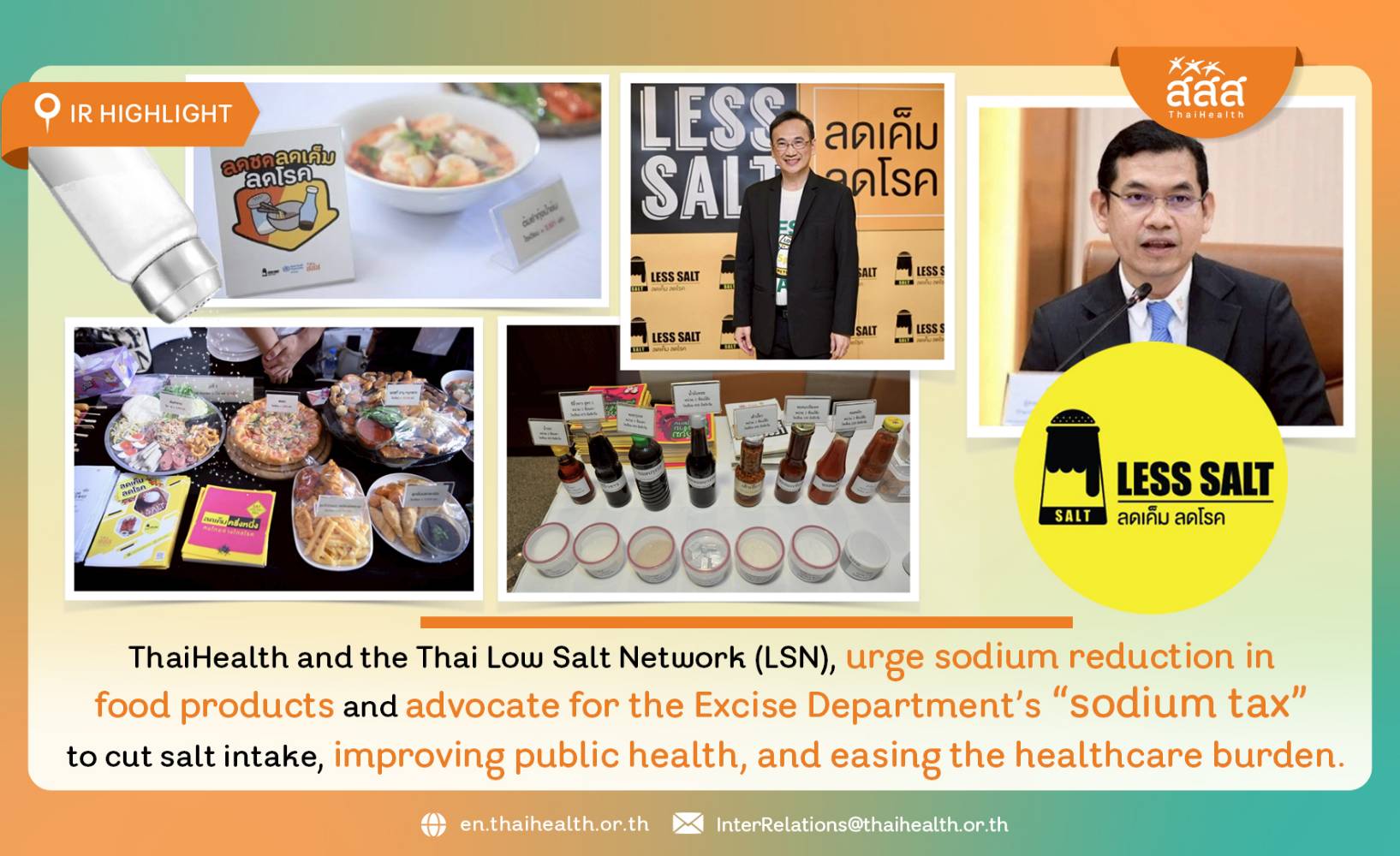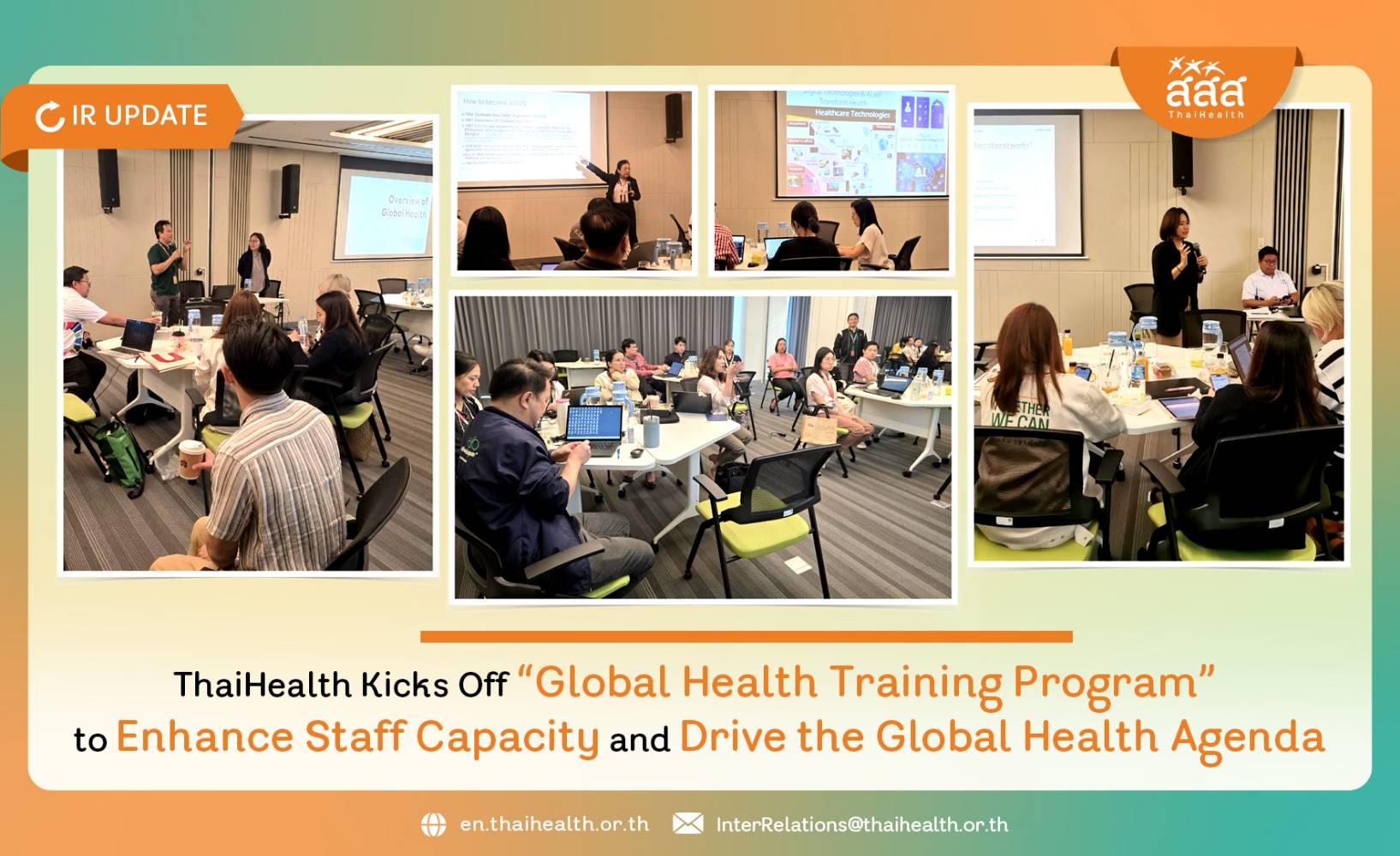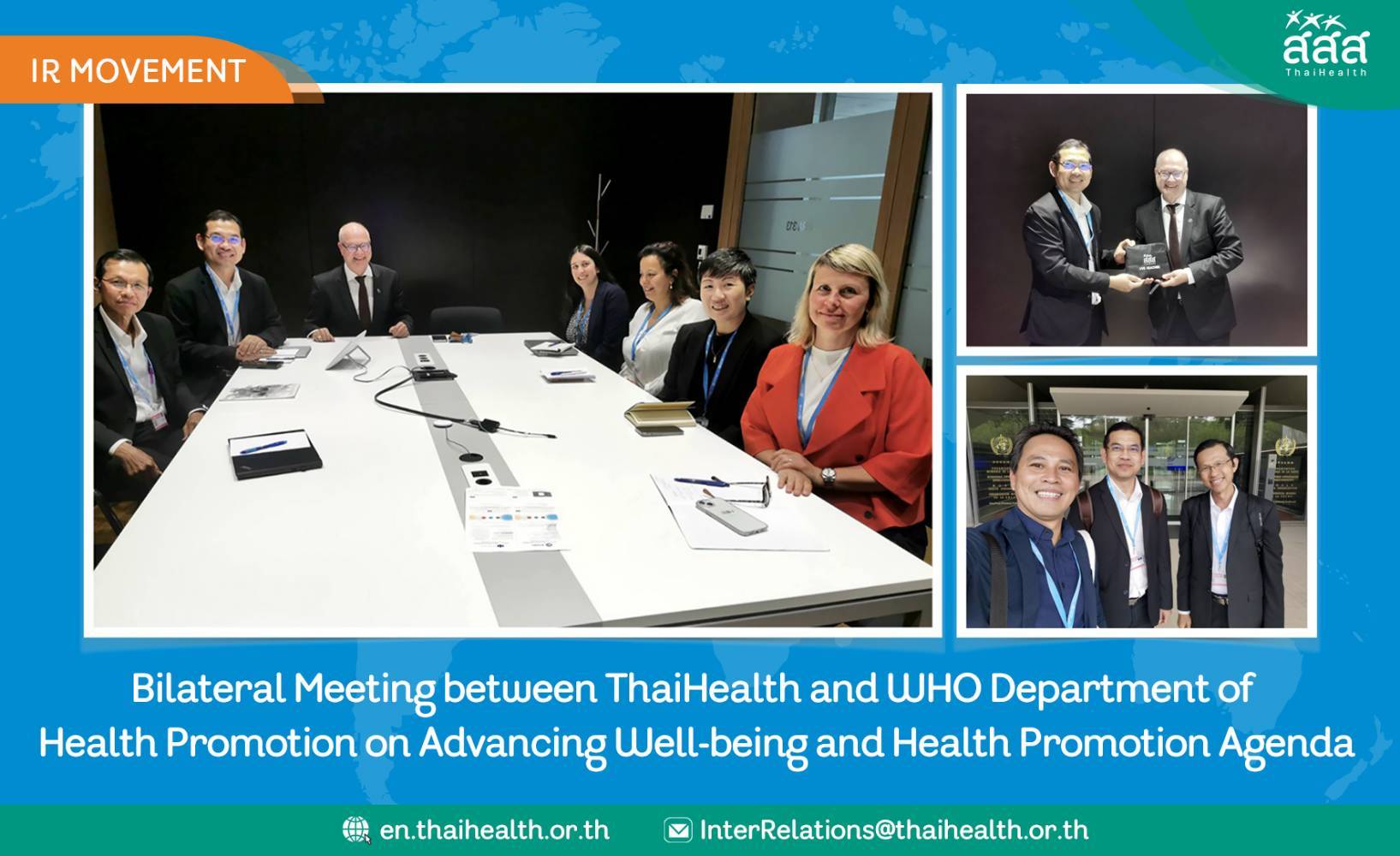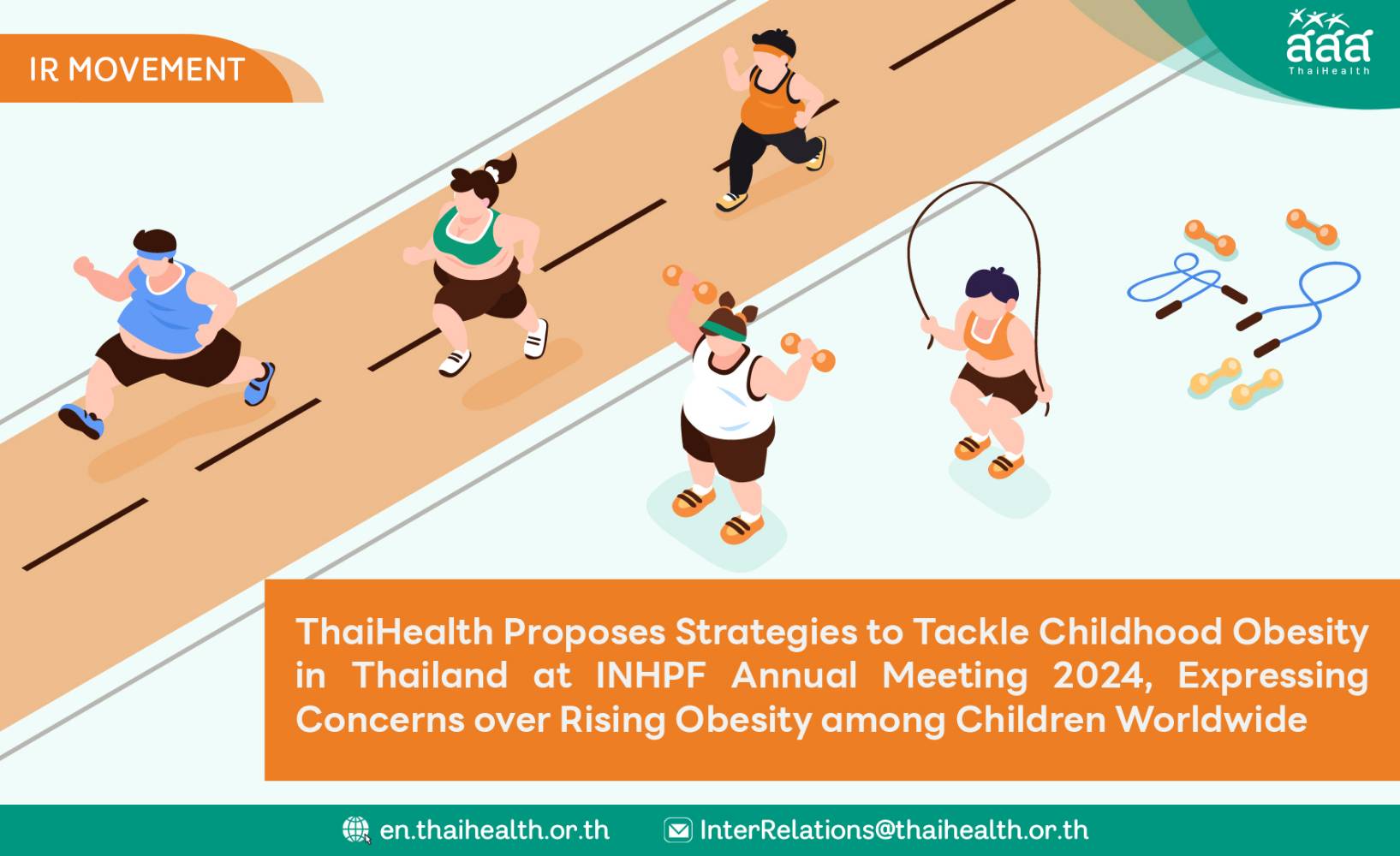
ThaiHealth Proposes Strategies to Tackle Childhood Obesity in Thailand at INHPF Annual Meeting 2024, Expressing Concerns over Rising Obesity among Children Worldwide
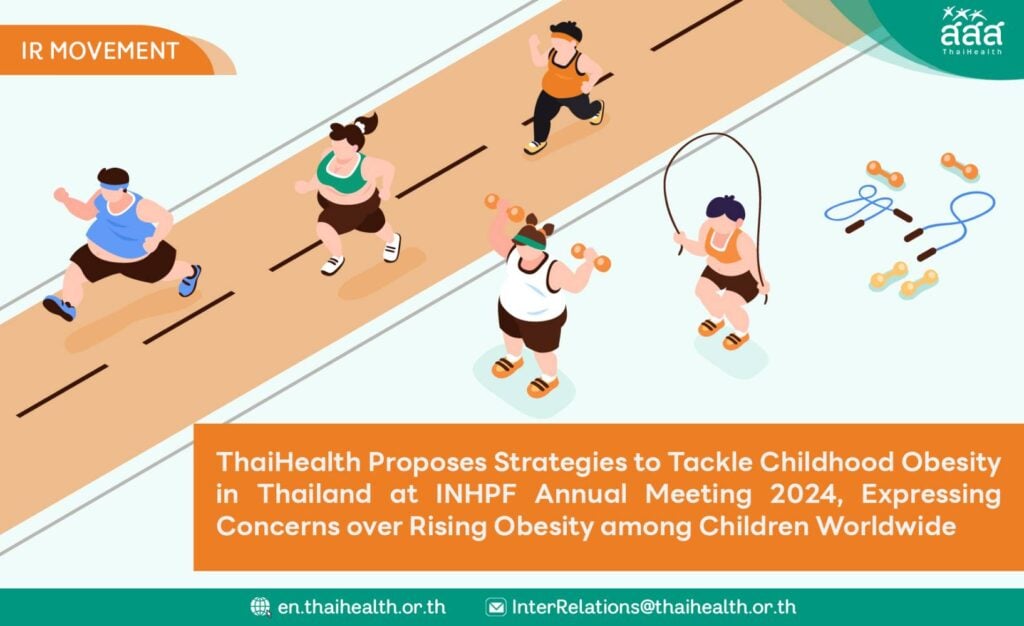
ThaiHealth Proposes Strategies to Tackle Childhood Obesity in Thailand at INHPF Annual Meeting 2024, Expressing Concerns over Rising Obesity among Children Worldwide
At the 21st Annual Meeting of the International Network of Health Promotion Foundations 2024 (21st INHPF Annual Meeting 2024) and Queensland Prevention Symposium, held from September 2-5, 2024, in Queensland, Australia, the executives of the Thai Health Promotion Foundation (ThaiHealth) joined the discussion with member countries of the International Network of Health Promotion Foundations (INHPF) on addressing childhood obesity. One of the serious health issues causing global concern is obesity in many children worldwide. In fact, nearly one-fifth of children around the world are overweight or obese, including 39 million children under the age of five and 340 million children aged 5-19.
Participating in the discussion were member organizations, including the Thai Health Promotion Foundation (ThaiHealth), the Singapore Health Promotion Board, the Tonga Health Promotion Foundation, and Australia’s Health and Wellbeing Queensland.
Childhood obesity stems from unhealthy eating habits that affect health, society, and the economy. It has been exacerbated by a variety of challenges such as COVID-19, climate change, and economic recession, resulting in increased prices for fresh food and greater marketing of unhealthy processed foods. The leading contributors to childhood obesity stem from the surrounding environment. In particular, decreased outdoor activities and increased screen time among children contribute significantly to the prevalence of obesity in children.
The Thai Health Promotion Foundation (ThaiHealth) found that in 2023, over 48.35% of Thais were overweight or obese. Over the past two decades between 1995 and 2014, the proportion of Thai children aged 1-5 years with overweight and obesity by the weight-for-height criteria rose from 5.8% to 11.4%, and it increased from 5.8% to 13.9% among those aged 6-14 years. The prevalence of overweight and obesity in Thai children is likely continue rising in the future, signaling a health crisis among the Thai population. Notably, 8.98% of children aged under 5 years and 13.72% of those aged 5-18 were obese.
To tackle the long-term health and life quality issues in children, ThaiHealth has laid out guidelines and measures, including promoting the consumption of healthy foods such as fruits, vegetables, and whole grains, reducing the consumption of sugary, salty, and fatty foods, promoting physical activity, and providing preconception care and prenatal care to support the health of expectant mothers, which can affect children’s health in the long term. Additionally, the measures focus on diets and physical activity for preschool children, health, nutrition, and physical activity for school-aged children, and weight management for overweight and obese children.
ThaiHealth has joined efforts with its network partners, such as Healthy Kids Healthy Food, to advance initiatives under the Tri-Power Strategy. In this strategy, policy power focuses on advocating policies and laws regarding reduction of risk factors for non-communicable diseases (NCDs), such as banning the sale of sugary beverages in schools, imposing taxes on sugary beverages, enhancing school lunch programs, and implementing a national plan for promoting physical activity. Meanwhile, academic power involves building databases and conducting research to inform planning and implementation, such as carrying out surveys on physical activity behaviors among people, developing disease surveillance systems, and producing public relation materials to educate the public. Finally, social power entails fostering community involvement in health promotion activities, for example campaigns to promote consumption of fruits and vegetables, promoting regular physical activity among the public, and establishing collaborative networks of partners.
In addition, the Healthy Kids Healthy Food initiative seeks to address the issue of children who are becoming overweight and developing obesity. It is in commemoration of Her Royal Highness Princess Maha Chakri Sirindhorn and adopts a comprehensive approach to food and nutrition management in schools based on the eight activities of the royal initiative, including school-based agriculture, student cooperatives, food management, monitoring nutritional status, fostering healthy habits, promoting environmental health, healthcare services, and learning management. This initiative has been found effective in addressing the issue of early-stage obesity and obesity among students. Specifically, a 19% drop in the incidence of early-stage obesity among students was observed in 472 schools under the Office of the Basic Education Commission (OBEC) joining the Healthy Kids Healthy Food initiative between 2014 and 2016, compared to those which did not participate in the initiative.
The food policy initiatives advanced by ThaiHealth and its partners aim to tackle health problems resulting from unhealthy diets, such as the sugar-sweetened beverage tax (SSB Tax) imposing taxes on beverages with high sugar content to reduce consumption and encourage consumers to opt for lower-sugar alternatives, prohibition on trans fats in all foods, and nutritional labeling which mandates manufacturers to display nutritional information on their products, allowing consumers to compare products and make informed and healthier choices. Additionally, the soda-free schools initiative is aimed at encouraging schools to refrain from selling sugary beverages, thereby contributing to better health among students, while the sodium-reduction strategy seeks to reduce sodium content in foods, which serves as a crucial risk factor for high blood pressure. In addition, the initiatives focus on regulating child-directed food marketing by restricting advertisements and marketing of unhealthy foods to children and promoting breastfeeding as the optimal nutrition for infants.
As for promoting physical activity among all population groups, especially children and adolescents, ThaiHealth has continuously collaborated with its partners across all sectors to promote physical activity. In particular, the National Physical Activity Strategy has been formulated to determine long-term directions and goals for promoting physical activity, and ThaiHealth has collaborated with international organizations, such as the World Health Organization (WHO) and the International Society for Physical Activity and Health (ISPAH), to share knowledge and translate it into practice. Moreover, its efforts have focused on promoting public spaces for physical activity, improving the environment in schools and communities to facilitate physical activity, adopting technology to promote physical activity such as developing applications for tracking physical activity, and raising public awareness about the importance of physical activity through various media.
In addition, there have been advertising campaigns aimed at raising public awareness and promoting changes in consumption behavior, for example the How to Reduce Sugar Intake campaign by the Sweet Enough Network to shift Thai children’s eating habits to reduce sugar intake, thereby lowering the risk of NCDs and the Reduce Belly Fat, Reduce Disease campaign to raise public awareness of the significance of health, especially the issue of abdominal obesity. Moreover, the “Consume 400 Grams of Fruits and Vegetables Daily” campaign has been launched to promote increased consumption of fruits and vegetables among all Thais. Additionally, other campaigns have been conducted to promote physical activity among Thai children. In particular, the Balanced Triangle campaign promotes proper nutrition, exercise, and sleep; it encourages at least 60 minutes of daily physical activity and a well-balanced diet.
Childhood obesity in Thailand is a major health concern which considerably affects children’s health. Considering this, ThaiHealth and its partners have advanced policies, such as increasing taxes on beverages with high sugar content, fostering collaborative efforts across all sectors to tackle issues, and allocating budgets and monitoring the results. At the community level, various programs have been promoted, while efforts at the individual level have focused on encouraging families to change their consumption behaviors, such as eating healthy foods and engaging in physical activity.
As reported by the Singapore Health Promotion Board, Singapore itself has observed childhood obesity starting from the age of 5. In addition, 70% of those with obesity at the age of 7 tend to remain overweight into adulthood. Factors contributing to childhood obesity include a lack of physical activity, excessive screen time, poor dietary habits, and consumption of unhealthy beverages.
Singapore places emphasis on driving collaborative efforts across various sectors, including the government, private sector, families, schools, and communities, by creating environments that are conducive to children’s lifelong health and promote healthy behaviors. These have been done to mitigate the risk factors for obesity and NCDs by promoting consumption of healthy foods, especially vegetables, fruits, whole grains, and protein from quality sources, regular exercise to maintain good health and reduce risk factors for different diseases, managing screen time with a suitable schedule, and getting adequate sleep to allow the body to rejuvenate itself effectively.
Singapore’s approach to combatting childhood obesity focuses on instilling healthy behaviors in children from a very young age. In particular, it involves obtaining data on children’s eating habits, exercise, screen time, and sleep patterns. The data will be drawn on to develop plans and implement interventions to modify their behaviors effectively as well as to create environments conducive to healthy habits among children.
Meanwhile, the Tonga Health Promotion Foundation recognizes childhood obesity as a significant health issue which impacts many children worldwide, including those in Tonga itself. In response, the Foundation has implemented policies to address public health issues, particularly advancing policies to tackle childhood obesity, which will promote public health and reduce long-term health burdens. Specifically, the school food policy is focused on improving the nutritional value of school lunches by increasing the amount of fruits and vegetables while reducing processed foods and foods with high sugar content. The health policy is aimed at promoting public health, especially children and adolescents, through different initiatives such as encouraging exercise and providing nutrition education. Finally, the tax policy involves increasing taxes on unhealthy products, such as sugary beverages and junk food, to reduce consumption of those items and encourage consumers to opt for healthier products.
Various childhood obesity intervention programs have also been implemented. For example, in the School Health Promotion program, participating schools are assessed on defined criteria and awarded as an incentive and encouragement. The Mai e Nima program focuses on promoting four areas of nutrition to ensure good health for adolescents and their families, namely promoting healthy breakfasts, improving school lunches, increasing consumption of fruits and vegetables, and ensuring adequate water consumption. More importantly, the program promotes physical activity. A clear framework has been developed to ensure effective collaboration between communities, schools, the government, and private organizations in promoting good health and well-being of adolescents in Tonga.
Apart from that, Australia’s Health and Wellbeing Queensland has observed obesity among its population. Specifically, two-thirds of Australian adults are overweight or obese, while one-quarter of children in Queensland suffer the same issue. The prevalence of obesity costs Queensland $556 million annually in healthcare expenses. As a result, Australian citizens are burdened with paying an additional $678 in taxes per person each year to compensate for the costs of obesity. This highlights the severity of the obesity problem in Queensland and its far-reaching impacts on health and the economy.
Australia has implemented public health promotion initiatives in communities by focusing on providing access to safe food and health-promoting physical activity. For instance, the A Better Choice program is aimed at creating conducive environments for healthy foods and beverages when eating out. Meanwhile, the Pick of the Crop program seeks to promote the consumption of fruits and vegetables in Queensland schools by linking schools with farmers to foster the consumption of local produce and promoting family and community involvement in child health promotion. Also, the Pod Squad program, an online program, addresses three areas, including nutrition, physical activity, and overall health, to enhance well-being among children and their families. Finally, the Clinicians Hub platform is designed to assist healthcare professionals in preventing, caring for, and referring patients, both adults and children, with chronic diseases.
With the world grappling with childhood obesity, countries leading in health promotion are accelerating efforts to address and prevent this crisis while advancing various health measures to ensure sustainable health for their populations.


